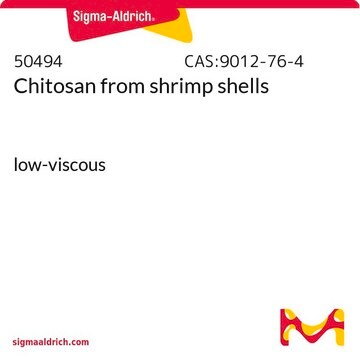C3646
Chitosan
from shrimp shells, ≥75% (deacetylated)
Synonym(s):
Deacetylated chitin, Poly(D-glucosamine)
About This Item
Recommended Products
biological source
shrimp shells
Assay
≥75% (deacetylated)
form
powder or flakes
color
white to beige
mp
102.5 °C ((216.5 °F ))
solubility
acetic acid: water: 10 mg/mL, slightly hazy to hazy (with extensive sonication)
H2O: insoluble
organic solvents: insoluble
bulk density
0.15‑0.3 g/cm3
storage temp.
room temp
InChI
1S/C56H103N9O39/c1-87-56(86)65-28-38(84)46(19(10-74)96-55(28)104-45-18(9-73)95-49(27(64)37(45)83)97-39-12(3-67)88-47(85)20(57)31(39)77)103-54-26(63)36(82)44(17(8-72)94-54)102-53-25(62)35(81)43(16(7-71)93-53)101-52-24(61)34(80)42(15(6-70)92-52)100-51-23(60)33(79)41(14(5-69)91-51)99-50-22(59)32(78)40(13(4-68)90-50)98-48-21(58)30(76)29(75)11(2-66)89-48/h11-55,66-85H,2-10,57-64H2,1H3,(H,65,86)/t11-,12-,13-,14-,15-,16-,17-,18-,19-,20-,21-,22-,23-,24-,25-,26-,27-,28-,29-,30-,31-,32-,33-,34-,35-,36-,37-,38-,39-,40-,41-,42-,43-,44-,45-,46-,47-,48+,49+,50+,51+,52+,53+,54+,55+/m1/s1
InChI key
FLASNYPZGWUPSU-SICDJOISSA-N
Looking for similar products? Visit Product Comparison Guide
Application
Features and Benefits
Quality
Preparation Note
Analysis Note
Other Notes
Storage Class Code
11 - Combustible Solids
WGK
nwg
Flash Point(F)
Not applicable
Flash Point(C)
Not applicable
Personal Protective Equipment
Certificates of Analysis (COA)
Search for Certificates of Analysis (COA) by entering the products Lot/Batch Number. Lot and Batch Numbers can be found on a product’s label following the words ‘Lot’ or ‘Batch’.
Already Own This Product?
Find documentation for the products that you have recently purchased in the Document Library.
Articles
Carcinogenic compounds in elastomers: 1,3-butadiene and isoprene used in elastomer manufacturing, classified as carcinogenic by IARC.
Our team of scientists has experience in all areas of research including Life Science, Material Science, Chemical Synthesis, Chromatography, Analytical and many others.
Contact Technical Service




